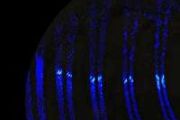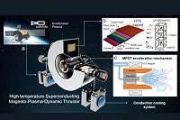
Copernical Team
Revolutionising astronaut fitness for deep space missions

As we prepare for missions beyond Earth orbit, one crucial challenge remains: keeping astronauts healthy in microgravity. Without daily exercise, their muscles, bones and cardiovascular systems weaken, which could impact mission success and astronaut safety, especially in destinations such as the Moon or Mars, where crew will have to operate autonomously immediately after landing.
The EGT Programme: your road to space

Dreaming of a career in space? The 2026 ESA Graduate Trainee opportunities are launching soon! It’s time to polish up your CV, craft your motivation letter and get ready to reach for the stars.
Proba-3: our eyes on the Sun’s inner corona
 Image:
Proba-3: our eyes on the Sun’s inner corona
Image:
Proba-3: our eyes on the Sun’s inner corona ExoAnalytic tools to power FireSat wildfire monitoring constellation
 ExoAnalytic Solutions Inc. has been selected to develop advanced software and visualization tools for the Earth Fire Alliance FireSat program, an emerging satellite constellation designed specifically to serve the global wildfire community. The company, which focuses on space and defense technologies, will provide capabilities aimed at improving how FireSat data is presented and used by frontlin
ExoAnalytic Solutions Inc. has been selected to develop advanced software and visualization tools for the Earth Fire Alliance FireSat program, an emerging satellite constellation designed specifically to serve the global wildfire community. The company, which focuses on space and defense technologies, will provide capabilities aimed at improving how FireSat data is presented and used by frontlin Keck backed team advances first graviton detector concept
 Modern physics faces a deep inconsistency between quantum theory, which explains nature using discrete particles and interactions, and general relativity, which describes gravity as a smooth curvature of space and time. For gravity to fit into a unified quantum framework, it must be mediated by particles called gravitons, but detecting even a single graviton was long considered fundamentally imp
Modern physics faces a deep inconsistency between quantum theory, which explains nature using discrete particles and interactions, and general relativity, which describes gravity as a smooth curvature of space and time. For gravity to fit into a unified quantum framework, it must be mediated by particles called gravitons, but detecting even a single graviton was long considered fundamentally imp China lofts AlSat 3A imaging craft for Algeria
 China has launched a Long March 2C rocket carrying a remote sensing satellite for Algeria, extending long running space cooperation between the two countries.
The two stage launcher lifted off at 12:01 pm local time from the Jiuquan Satellite Launch Center in the Inner Mongolia autonomous region and placed the AlSat 3A spacecraft into its planned orbit.
Project contractor China Great
China has launched a Long March 2C rocket carrying a remote sensing satellite for Algeria, extending long running space cooperation between the two countries.
The two stage launcher lifted off at 12:01 pm local time from the Jiuquan Satellite Launch Center in the Inner Mongolia autonomous region and placed the AlSat 3A spacecraft into its planned orbit.
Project contractor China Great Atomic 6 debris shields selected for Portal Space Systems mission
 Atomic-6 has secured a key deployment of its Space Armor tiles as the primary micrometeoroid and orbital debris protection system on an upcoming Portal Space Systems spacecraft that will fly on SpaceX's Transporter 18 rideshare mission in October 2026 aboard a Falcon 9 rocket. The flight will mark the first operational orbital deployment of Space Armor tiles, moving the material from earlier tes
Atomic-6 has secured a key deployment of its Space Armor tiles as the primary micrometeoroid and orbital debris protection system on an upcoming Portal Space Systems spacecraft that will fly on SpaceX's Transporter 18 rideshare mission in October 2026 aboard a Falcon 9 rocket. The flight will mark the first operational orbital deployment of Space Armor tiles, moving the material from earlier tes China Sky Eye tracks binary-triggered fast radio burst activity
 An international team of astronomers has obtained the first decisive evidence that at least some fast radio bursts originate in binary stellar systems rather than from isolated objects. The work centers on an active repeating fast radio burst source about 2.5 billion light years away that shows a sudden and transient change in its magnetic environment consistent with material expelled from a ste
An international team of astronomers has obtained the first decisive evidence that at least some fast radio bursts originate in binary stellar systems rather than from isolated objects. The work centers on an active repeating fast radio burst source about 2.5 billion light years away that shows a sudden and transient change in its magnetic environment consistent with material expelled from a ste Iron bar of hot plasma revealed inside Ring Nebula
 Astronomers using a powerful new multi-object spectrograph on the William Herschel Telescope have uncovered a previously unknown bar-shaped cloud of ionised iron inside the famous Ring Nebula. The structure, described in Monthly Notices of the Royal Astronomical Society, stretches across the inner region of the nebula and contains a mass of iron atoms comparable to the mass of Mars.
The Ri
Astronomers using a powerful new multi-object spectrograph on the William Herschel Telescope have uncovered a previously unknown bar-shaped cloud of ionised iron inside the famous Ring Nebula. The structure, described in Monthly Notices of the Royal Astronomical Society, stretches across the inner region of the nebula and contains a mass of iron atoms comparable to the mass of Mars.
The Ri Hidden magma oceans could shield rocky exoplanets from harmful radiation
 Deep beneath the surface of distant exoplanets known as super-earths, oceans of molten rock may be doing something extraordinary: powering magnetic fields strong enough to shield entire planets from dangerous cosmic radiation and other harmful high-energy particles.
Earth's magnetic field is generated by movement in its liquid iron outer core - a process known as a dynamo - but larger rock
Deep beneath the surface of distant exoplanets known as super-earths, oceans of molten rock may be doing something extraordinary: powering magnetic fields strong enough to shield entire planets from dangerous cosmic radiation and other harmful high-energy particles.
Earth's magnetic field is generated by movement in its liquid iron outer core - a process known as a dynamo - but larger rock 






























